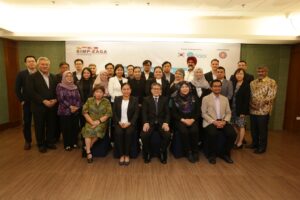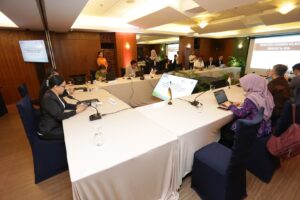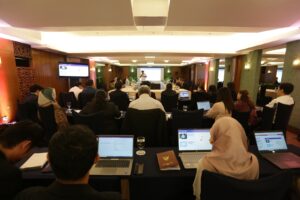Menu

The ASEAN Centre for Energy (ACE) successfully organised the 1st Regional workshop of Development of Conceptual Framework of Renewable Energy Certificate System (RECAP) in Brunei Darussalam-Indonesia-Malaysia-Philippines – East ASEAN Growth Area (BIMP-EAGA) Countries. The workshop was held on 25 September 2023 in conjunction with the 10th BIMP Power and Energy Infrastructure Cluster (PEIC) Meeting, at the Princessa Garden Hotel, Palawan, Philippines.
Funded by BIMP Korean Cooperation Fund (BKCF), supported by Global Green Growth Initiative (GGGI) as BKCF secretariat, and co-organised by Department of Energy (DOE) Philippines, this hybrid workshop was aimed to (i) Comprehensively update stakeholders on the projects trajectory, and (ii) Gather inputs from the key stakeholders (i.e., governments, public utilities, Renewable Energy Certificate (REC) registries, etc.) on their national REC development. The workshop was attended by 53 participants from Brunei Darussalam, Indonesia, Malaysia, and Philippines, including the representative from the ASEAN Centre for Energy (ACE) and Asia CarbonX Change Plt (ACCP).
In the opening remarks, Dr Nuki Agya Utama, Executive Director of ASEAN Centre for Energy (ACE), urged strong commitment from BIMP-EAGA countries to support the ASEAN Plan of Action for Energy Cooperation (APAEC) Phase II: 2021-2025 target in achieving 23% renewable energy share in Total Primary Energy Supply (TPES) and 35% share in installed capacity by 2025. He addressed one of the instruments to maximise any potential including the Renewable Energy Certificate (REC) and highlighted the need concerning REC drivers, issues, readiness, as well as the requirement for a common standard to facilitate a regional market.

During the morning session, under the themed “Overview of the International REC Market and Best Practices from ASEAN”, the representatives of BIMP-EAGA Countries provided updates on the status of REC frameworks within their respective nations. The discussion included insights into potential markets, existing supportive policies, and the intricacies of system development planning. Proceeded with the theme “ASEAN Power Grid (APG) and Discussions on the REC Framework in BIMP-EAGA Countries” for the afternoon session, the discussion focused on the integration of renewable energy within the context of the APG and the potential implications of existing/future cross-border power trade mechanisms on REC adoption and utilisation.

The one-day workshop concluded with the following summary points, i) Benefit of setting up regional/cross-border REC will trigger cross-border transactions and can drive or stall major infrastructure investment. National/regional agreement on REC markets can directly impact the acceptance of cross-border trade, and ii) Necessity of understanding/finetuning the local/national context prior to engaging further in sub-regional/regional REC mechanisms. Such as localization in each country, transparency/auditable instrument, and communication to stakeholder are necessary.
